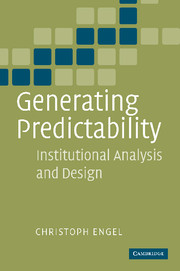Book contents
- Frontmatter
- Contents
- Preface
- Notation
- 1 Introduction
- 2 The psychological predictability problem
- 3 Rational choice responses
- 4 Behaviourally informed responses
- 5 Behaviourally determined responders
- 6 Outlook: implications for interaction with higher complexity
- 7 Predictability at the crossroads of competing institutionalisms
- Equations
- References
- Index
3 - Rational choice responses
Published online by Cambridge University Press: 22 September 2009
- Frontmatter
- Contents
- Preface
- Notation
- 1 Introduction
- 2 The psychological predictability problem
- 3 Rational choice responses
- 4 Behaviourally informed responses
- 5 Behaviourally determined responders
- 6 Outlook: implications for interaction with higher complexity
- 7 Predictability at the crossroads of competing institutionalisms
- Equations
- References
- Index
Summary
Introduction
What would a fully rational actor do after he has read the foregoing chapter? In a nutshell, this is what the present chapter investigates. Another way of putting this is: this chapter is looking for behaviourally safe solutions. It takes the findings about behavioural dispositions as a given, as well as the knowledge about how they play themselves out at the behavioural level. Ego is thus assumed to be fully aware of the predictability problem generated by the high plasticity of human behavioural dispositions. He is further assumed to be a classic Homo oeconomicus. At a later stage in the chapter a third assumption is added. Alter is also assumed to be rational in so far as he responds to the action of Ego. In so doing, the chapter follows an approach frequently used in work by economists on irrational behaviour. Finally, for the purposes of this chapter, human behavioural dispositions and the ensuing predictability problem are seen as exogenous. This chapter thus only looks at institutional reactions to a predictability problem that is ‘out there’. In keeping with methodological individualism, it does not consider intervention that aims at proactively changing behavioural dispositions.
Ironic critics see this as the approach of rational demons. And indeed, the idea of having rational reactions to one's own irrationality is highly counterfactual. But there is value in the approach. The strongest argument stems from the philosophy of science. Developing a powerful paradigm is a demanding social exercise.
- Type
- Chapter
- Information
- Generating PredictabilityInstitutional Analysis and Design, pp. 65 - 191Publisher: Cambridge University PressPrint publication year: 2005



